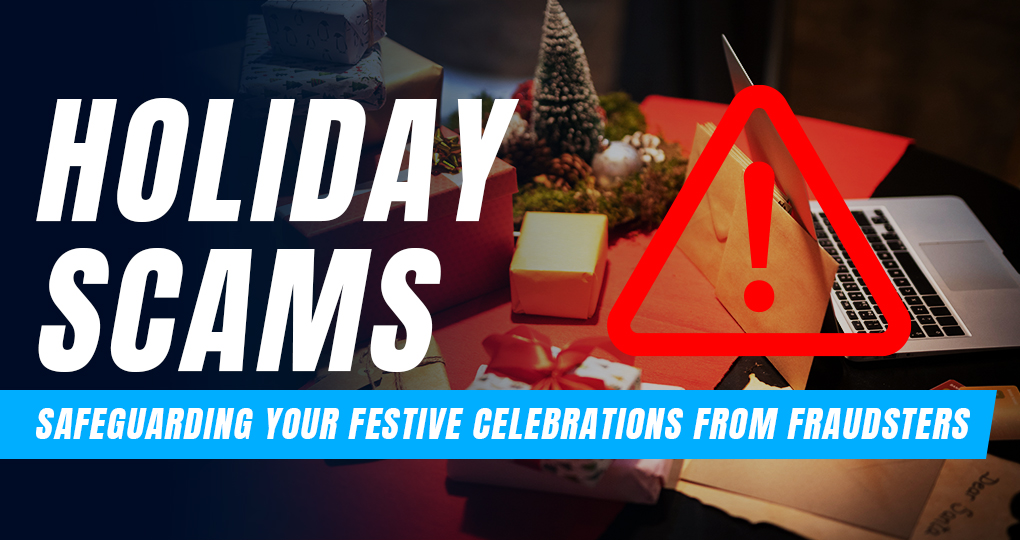Intelice Solutions: Blog

Holiday Scams: Safeguarding Your Festive Celebrations from Fraudsters
As the holiday season approaches, (beginning a few weeks ago back with Black Friday, Cyber Monday and Giving Tuesday), millions of people will engage in online shopping to find gifts for their loved ones. Along with the anticipation and excitement of the holidays, however, comes an increase in scammers trying to deceive people into giving away their money and personal information. With the latest information and insight into online holiday shopping, you can arm yourself with the knowledge necessary to identify and avoid these deceptive tricks.
Recent findings reveal that the average loss to victims of shopping scams during the holiday season was a staggering $1,500, resulting in a decline of consumer confidence in the ability to shop online safely from 89% to 72%.
To no surprise, many Americans (56%) are concerned about becoming a victim of cyber crimes this holiday season. With online shopping scams, phishing scams, delivery notification scams, and gift card scams being the most common, it is crucial to stay informed and vigilant in order to enjoy a secure holiday shopping experience.
Key Takeaways
- Be aware of common holiday scams including online shopping, phishing, delivery notifications, and gift card scams.
- Consumer confidence in online shopping has dropped, emphasizing the need for vigilance and secure practices.
- Educate yourself and stay informed to protect against cyber threats and potential holiday scams.
10 Holiday Scams to Be Cautious of in 2023
1. Online Shopping Scams
Beware of online shopping scams where fraudsters create fake websites mimicking popular retailers. They lure victims in with heavily discounted prices and enticing perks like free shipping. Be extra cautious when shopping for electronics, toys, clothing, and other holiday gifts.
2. Phishing Scams
Phishing scams involve cybercriminals posing as trusted sources to trick you into clicking malicious links or sharing personal information. Be skeptical of any unexpected emails, text messages, or instant messages requesting sensitive data.
3. Bogus Delivery Scams
As you await your holiday packages, be alert of fake delivery notifications from scammers impersonating postal services or well-known brands like Amazon, FedEx, or UPS. Never enter personal or financial information on unverified sites linked from such notifications.
4. Gift Card Scams
Scammers may text, call, or email you with a fraudulent financial issue and demand repayment by sending gift card numbers and PINs. Always verify the legitimacy of any request for gift card payments.
5. Overpayment Scams
Overpayment scams involve a scammer offering to buy an item with a check amounting to more than the asking price. They then request the excess amount back, only for their check to later bounce, leaving the seller at a loss.
6. Charity Scams
During the holiday season, generosity can be exploited by scammers imitating genuine charities or creating fake ones to steal your donations. Always research before donating and stick to reputable organizations.
7. Travel-Related Booking Scams
Travel-related booking scams feature fake hotel and flight booking sites luring victims into sharing personal data or making payments. Stick to well-known and legitimate travel booking sites and avoid deals that seem too good to be true.
8. Fake Gift Exchanges
Be cautious of “Secret Sister” gift exchanges on social media, which are pyramid schemes falsely promising an abundance of gifts in return for one gift and your personal information. Stick to traditional events like White Elephant or Secret Santa exchanges.
9. Temporary Holiday Job Scams
Scammers may send tempting job offers via email, urging you to click on a link for further information or provide personal data. Be critical of any unsolicited job offers and verify the company’s legitimacy before pursuing an opportunity.
10. Imposter Scams
Imposter scams involve scammers pretending to be someone you trust in order to trick you into sending money or providing personal data. Always verify the identity of the sender before responding to unfamiliar messages.
How to Stay Secure this Holiday Season
As you prepare for the festivities, it’s essential to remember that security is equally important. During the holiday season, scammers are on the lookout for susceptible individuals. Follow these tips to ensure your cyber safety:
- Be cautious with promotional emails: Cybercriminals often use holiday-themed spam emails to spread malware. To avoid falling victim, always verify the sender’s address, be cautious of unsolicited emails, and refrain from clicking on unknown links or attachments.
- Use strong and unique passwords: Holiday shopping often requires numerous accounts. Make sure to create strong, unique passwords for each one, and consider using a password manager.
- Keep software up-to-date: Regularly update your computer and devices’ operating systems, antivirus software, and web browsers. These updates often contain essential security patches.
- Be mindful of public Wi-Fi: Using public Wi-Fi networks can expose your data to hackers. Consider using a virtual private network (VPN) to encrypt your connection if you must use public Wi-Fi.
- Secure your online transactions: When making online purchases, ensure the website uses secure socket layer (SSL) encryption indicated by a padlock icon in the address bar. Also, always use a credit card instead of a debit card for better fraud protection.
By following these simple steps, you can safeguard your information during the holiday season and enjoy stress-free festivities.
Don’t Let Scammers Ruin Your Holidays
When planning for the holidays, it’s crucial to stay vigilant against potential scams that could ruin your festivities. By following the guidelines outlined above, you can safeguard yourself from holiday scams and focus on enjoying the festive season.




